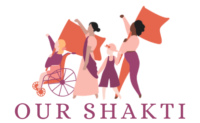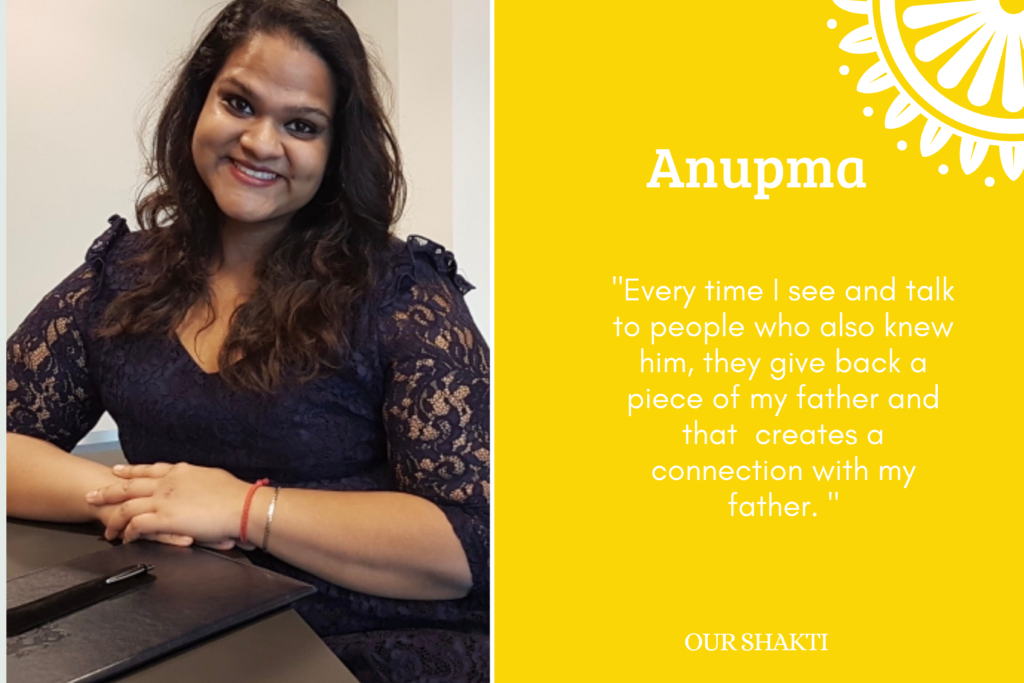Today I’m interviewing Anupma Bhageloe about the loss of her father. She is a musical woman and works at the municipality. In the Surinamese-Indian community, she is known as one of the members of BaithakSisters, a music group that mainly plays Baithak Gana. This is a style of music that was taken by the previous generations of Indian people from India to Suriname and Suriname to the Netherlands. Anupma inherited her passion for Baithak Gana from her father and aja (paternal grandfather). Her hobbies are playing music, crafting, writing lyrics, and swimming.
Anupma, you lost your father at a young age. How old were you when you lost him and what do you remember about him?
My father passed away on September 24, 1996. That was exactly two weeks before my fifth birthday. I still remember a lot about him. I remember well that he was a gentle and musical man. This is confirmed by the fact that I still run into his friends who ask “are you Sonny’s daughter?” Then they tell stories and say things like “he was a nice man” and “he did a lot for others.” My father was active in the Shri Sanatan Dew Mandir (Hindu temple) as a board member. He organized Divali and Holi celebrations. He brought Baithak Gana performers to the mandir. If there was no singing group on Sunday to sing the bhajans (devotional songs), he always knew friends who were willing to perform. It was busy and cozy. We also knew the bustle of the mandir at home, because every evening it seemed as if there was a party at our place. People were singing, eating, and dancing. Very cozy.
He was also a great support to my mother. I realized that later when I was older. My mother was working at the time. When my mother came home, dinner was ready and he had picked me and my sisters up from school.
You say that other people tell stories about him. How important is that to you?
Well, to give an example… In 2018 there was an immigration celebration. My sisters and I were there for a performance. I had never played a dhapla (instrument) before. My kaka (uncle) was standing at a stall and I had already walked past it a few times. I saw that dhapla and it tickled me like I want to play it. So my uncle looked at me and said, “Do you want to play it? Take it.” I started playing and people gathered around me, including some who knew my father. They said, “she has her father’s music skills.” They mainly talked about how the way I played that dhapla resembled how my father played it. Everyone confirmed that I was his daughter and that I adopted his music skills. So every time I see and talk to people who also knew him, they give back a piece of my father and that also creates a connection with my father. This is important to me because I feel like even if he is no longer there, he is still there.
How did you experience the loss of your father? How did it affect you?
I was a kid. What I can remember was realizing that he was gone, but I couldn’t accept it. My mother, sisters, and brother-in-law took care of me, but the event was incomprehensible. Whenever I sat in the car going somewhere, I said I saw him. It took me a long time to stop saying that. It took me a lot of effort to process it. Losing someone happens all at once, but processing the loss afterward is a long process. That is something you process every day for years. For example, on his birthday or the anniversary of his death, I think about it. I try to get strength, motivation, and support from everything he has given us. The biggest motivation in everything for me is my mother. She has raised four daughters on her own and married off the eldest two daughters. She has experienced many things, also in the workplace, and yet she has stood her ground.
What helped you to cope with the loss of your father?
At the time I was in class 1, so mostly talking. When I got older I started writing. Many people tried to help me through conversations. That didn’t always work. One time I got a tip from someone to keep a diary and direct it to my father so I can have a conversation with him that is for myself. That way I could write it off. At one point there was a time when I slept restlessly. I dreamed a lot. Then I discussed it with my mother and she told me not to direct that diary to him, but that it was enough to write down my thoughts whenever I felt the need. Afterward, I started writing less and talking more. That has been working like therapy and that gave me the incentive to pick up other things that I had left behind.
I wonder if you received counseling as a child with grieving.
That was not known to us in the 90s. Many agencies got off the ground in the 90s, such as the Children’s Phone and the Youth and Family Foundation. So the only guidance we could get was from the GP or psychologist, but mental help for children was still at an early stage. So I was able to cope with it with the support of my family. This is how I managed to muster up the courage and persevere when things were tough.
How did it affect the family?
My mother lost her life partner at a young age. She had four young children. She was momentarily unable to pick up things after my father passed away. There were aunts and grandmothers who supported her during this time. Within Hinduism, we have a number of religious ceremonies that have to be performed on certain days in the event of a death. On the 10th, 12th, 13th day, six months, and one year after death. This process entails bringing the person to his/her final destination afterlife. You can stimulate that as a family by performing those ceremonies and doing things that the soul needs in that journey.
Then you have some aunts who know everything much better than the priest who performs the ceremony. At the time, they brought in all kinds of things that had nothing to do with the situation, especially with the intention of putting pressure on my mother. So that other family members have more influence, especially when it comes to financial matters. Fortunately, my mother had the support of other people who have calmed things down.
It took her time to get back on track, but once she did, she went for it 100%. Over the years it was said that we wouldn’t be okay because she took care of us by herself. There was negative talk. My mother has only completed secondary education, the children are not going to get very far. My mother works in the hospitality industry, the children will also work in the hospitality industry. We proved that no, we can do it with the strength and encouragement of our mother and with our father in our hearts. I’m doing a college degree. I have a good position at the municipality. We are regarded in Surinamese-Indian community as Baithak Gana musicians. My sister and I have set up a Baithak Gana platform on Facebook so that we can bring together people worldwide who have an affinity for this music style. We want to create a database of everything related to Baithak Gana and then do something from there for the people who are fighting to keep Baithak Gana. There was a time when it got less attention than it deserved. My sister got the idea to create that platform so that we can preserve it and get the interest of young people. My father knew all the Baithak Gana artists in the Netherlands and brought the musicians together in the mandir (temple). We do the same only digitally.
We have supported each other over the years. We have kept my father alive in our minds and hearts through music.
What do you want to say to people who spoke negatively about you?
To the people who had prejudices about us, I would say: we did it. People said things like how are they going to manage without a father, they won’t get very far, a father is needed etc. Sure, a father is needed, but if a father is not physically there it doesn’t mean he is out of our lives. Someone is only really dead when you stop thinking about them. We have always kept him with us through music.
What do you want to say to people who haven’t lost a parent yet?
I focus on the children who are rude to their parents. The youngsters and adolescents who talk badly about their parents, reject parents, or do not want to be seen with parents in public. Your parents brought you to earth. If they weren’t there, you wouldn’t be there either. All the time, effort, money they’ve spent on you and wisdom they’ve brought you… okay, maybe you’ve also learned in school or from other people, but your parents are the foundation. If you don’t handle them well and they pass away, then you’re too late. Then you will realize what they mean to you, but then it will be too late. Then you want to say everything to them, but that is no longer possible. Show appreciation and gratitude to your parents by doing the groceries, giving flowers, or chocolate. Treat them well. Thank them for bringing you into the world.
Do you want to share something else?
Don’t forget where you come from. Don’t forget where you’ve been in hard times, don’t forget how you got to where you are now. Always keep in mind who has been there for you when you needed them. For example your parents, friends who have supported you, people who have given lyrics/songs. Do not forget that.
I am proud of who I am. That may sound arrogant, but I don’t care about that because people always thought I wouldn’t get very far. I did it. I owe that to my father, mother, sisters and the rest of the people who helped me in one way or another. I want to thank everyone who has supported me.

